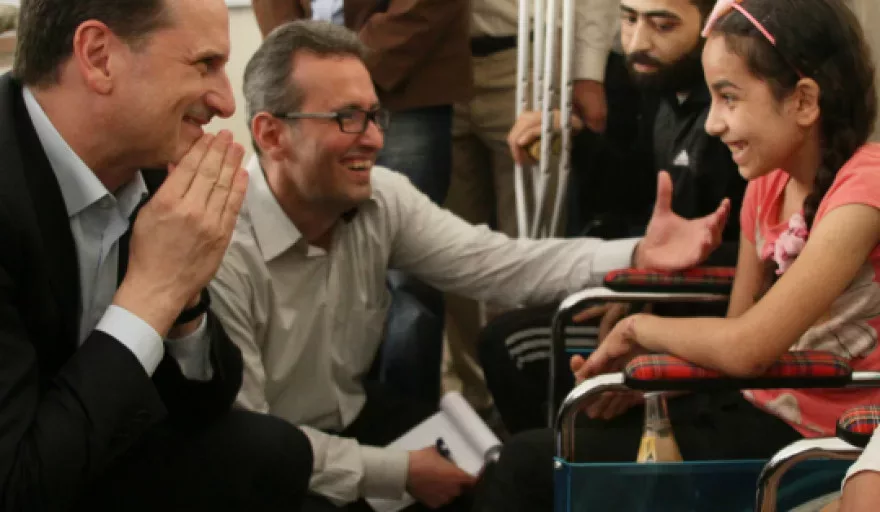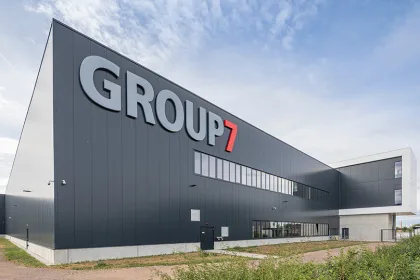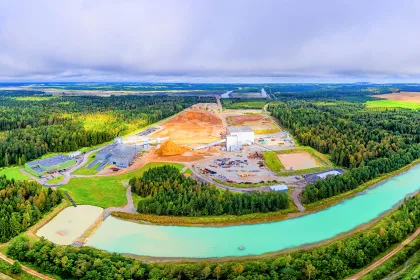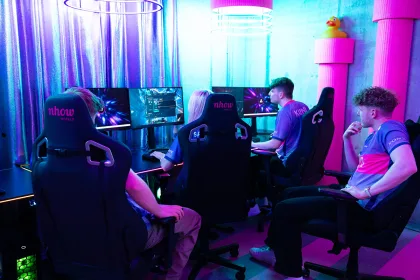Commissioner General of UNRWA, Pierre Krähenbühl, talks to us about the care and aid responsibilities of the company for five million registered Palestine refugees.
- Q&A WITH PIERRE KRHÄENBÜHL, COMMISSIONER GENERAL, UNRWA
- Inevitably, the crisis and emergency relief aspect of UNRWA’s work receives the most attention in the media, but what would you say is the most rewarding and important facet of UNRWA’s remit?
- To this end, what would you attribute as being the key statistics driving UNRWA’s ongoing functions, and the major success stories of UNRWA to help improve these situations?
- Who are the main partners of UNRWA helping to facilitate some of the main initiatives being implemented?
- Across the international community, what do you feel needs to be done to aid the overall crisis that isn’t being done at present, and how is UNRWA helping to raise awareness in this regard?
- With this in mind then, what would your forecast and hopes be moving forward; both for UNRWA and the overall situation?
Upon the United Nation’s decision in 1949 to create an organisation able to cater for the needs of hundreds of thousands of Palestinians who fled or were forced from their homes, the subsequently formed United Nations Relief and Works Agency for Palestine Refugees in the Near East (UNRWA) initiated a now-66-year-old journey; implementing vast improvements in care and aid over the years, in a context that has unfortunately only worsened.
Becoming operational on the ground in 1950, UNRWA today is responsible for more than five million registered Palestine refugees in five key areas; the West Bank, including East Jerusalem; Jordan; Lebanon; Syria; and the Gaza Strip. Its remits cover quasi state-like functions in education, health, microfinance, and camp maintenance; as well as the oft-documented emergency relief work that has commonly defined the plight across the Middle East in places such as Lebanon, the Gaza Strip and Syria in recent years.
UNRWA’s Commissioner General, Pierre Krähenbühl has held his post at the head of the Agency for the past three years and spoke to Europe & Middle East Outlook about the story so far, the life-changing works being carried out today, and the new horizon that UNRWA is hoping and helping to create.
Q&A WITH PIERRE KRHÄENBÜHL, COMMISSIONER GENERAL, UNRWA
Inevitably, the crisis and emergency relief aspect of UNRWA’s work receives the most attention in the media, but what would you say is the most rewarding and important facet of UNRWA’s remit?
Pierre Krähenbühl (PK): I think what I’ve found to be interesting since joining UNRWA almost three years ago -coming from a traditional emergency humanitarian background in the International Red Cross – is the dimension of education and how fundamental it is. In a way, when you work in humanitarian activities in crisis or conflict areas you assist people and provide for people who are victims of injustice; but you don’t necessarily combine that like UNRWA can do by investing in skills and capabilities and preserving prospects for the future generations of Palestinians. It’s been the investment in human capital that I find a very remarkable facet of UNRWA’s work.
To this end, what would you attribute as being the key statistics driving UNRWA’s ongoing functions, and the major success stories of UNRWA to help improve these situations?
PK: To give you a sense of the scale of it, there are 5.2 million Palestinian refugees at present, roughly the population of countries like Norway, Singapore, Ireland or Scotland. I try to draw, say, a Norwegian diplomat’s attention to this and the prospect of delivering services on a continuous basis for the whole population of Norway in areas that are marked by long-term and protracted conflict and very acute crises such as Syria or the Gaza Strip. It really requires huge amounts of adaptability in operational terms.
From an education perspective, we have 500,000 boys and girls in 700 schools that we run ourselves, we employ more than 20,000 teachers and education specialists. Healthcare-wise, around three million patients receive support in our clinics each year, while another 1.5 million people receive emergency aid.
These are the overall statistics but behind the statistics, what I find very striking is that every person we provide assistance to has a particular story and background and destiny, and it’s always important to highlight that individual human dimension; as these can often provide the signs of hope and the success stories.
I see so many of our students with remarkable resolve and energy and courage and I always say to our closest partners that that’s where we need to draw the energy from to continue. One humbling example was a 14-year old as part of a group of students in Gaza who was passionate about human rights and in discussion with our Secretary General, he simply asked: ‘Why don’t they apply to us then?’ I don’t think anyone who was present that day will forget that moment.
Who are the main partners of UNRWA helping to facilitate some of the main initiatives being implemented?
PK: In terms of partnerships with other agencies first of all, we have structural partnerships with two major UN organisations – UNESCO and the World Health Organisation who help us with our education and health programmes. There are also organisations for other parts of our work like the World Food Programme and UNICEF, as well – of course – as the host governments themselves who we have ongoing interactions with regarding areas of education etc.
Then of course we have essential partnerships when it comes to member states of the UN for diplomatic and financial support. UNRWA’s annual investments currently stand at about $1.2 billion in implementing its programmes, and that requires a considerable mobilisation of support from some of our key supporters across the US, the EU, the UK, Saudi Arabia, Central Europe, Scandinavia and Japan.
Across the international community, what do you feel needs to be done to aid the overall crisis that isn’t being done at present, and how is UNRWA helping to raise awareness in this regard?
PK: Arguably right now, we’re seeing the first challenge related to a multiplicity of crises. The focus on Syria or Libya or Gaza etc means, in historic terms, that comparisons are a bit more challenging for Palestinian refugees and the Palestinian issue. That comes from a lack of – not necessarily fundamental awareness – but perhaps intensity compared to some other crises. So it’s a responsibility on our side to reach out, to tell the story and to go back to stakeholders and public opinion and gauge through media or other forms of outreach to make sure the world doesn’t think it can overlook this issue.
With 5.2 million people in the Middle East – the unstable Middle East – with no political horizons or no fundamental prospects for change in their life, with no stability or dignity given to them; the world cannot afford to overlook this problem.
Whenever I travel, and I travel a lot, I realise that there is this general awareness and understanding but there is still a need to put this issue higher up on the agenda of decision makers.
With this in mind then, what would your forecast and hopes be moving forward; both for UNRWA and the overall situation?
PK: I’m not certain how realistic this is because if you look at the region then most of the indicators and parameters are pretty grim and discouraging in terms of finding a political solution, but I have to emphasise that there is nothing more important than to recreate the political horizon and to reengage politically. When I raise this I am met with a lot of scepticism in many circles, but I think scepticism is exactly what brought about these protracted, frozen and long-term conflicts. The cost of the lack of political engagement is rising exponentially.
We are mandated to find and search for solutions to problems we see every single day in a community full of despair and lacking in hope; and I think 2017 should bring about a renewed focus on political solutions. We cannot leave the region here unattended in political terms because, in my experience of 25 years in conflict zones, the more you leave situations unattended politically, the more they become polarised. Situations don’t just resolve themselves by magic or by leaving them to their own devices; so the international community must find a way to reengage the parties in order to recreate the horizon.
As proud as I am of all the work that UNRWA does and the services it provides, it’s clear to me that no community anywhere in the world – and that includes the Palestine refugee community – would wish to see another 50 years of UNRWA in exchange for finally seeing a solution to their plight and something that would allow them to turn the page and to live in dignity and self sufficiency.
So while we continue to mobilise and work energetically and creatively in order to continue to support them, that horizon is what we wish and hope for.


































